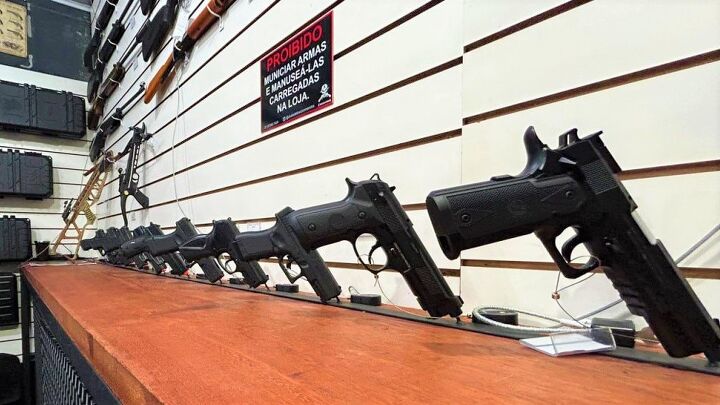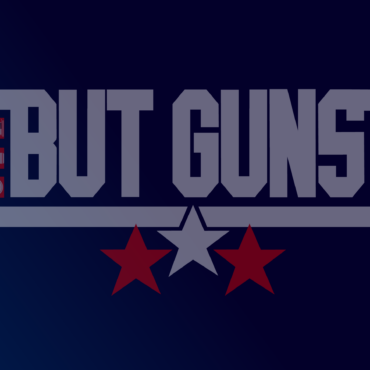Gun Shops and Gun Laws of Brazil: Lessons for the US Gun Community

Previously I wrote about the gun culture of Iraq, Pakistan, Saudi Arabia, UAE, and the Philippines. While all those places are fascinating, they seem a bit too exotic for a US gun owner. In the conversation about gun laws, US politicians like to use examples of Australia, and the UK, but often ignore countries that are more similar to the USA and even closer to it geographically – the countries of South America. Today, Brazil is the biggest and most populated South American country, with over 212,000,000 citizens. Like the US, it has a notable problem with gangs and violent crime, and it consists of different states and has a diverse population. Brazil’s size and demographics are pretty similar to those of the US. What can we learn from Brazil’s experience regarding gun laws? Apparently, a lot, because in recent years, Brazil’s government unintentionally conducted one of the biggest social experiments related to gun laws in the history of mankind.
History of Gun Laws in Brazil

In 2003, the gun laws of the country changed dramatically. Essentially, the system changed from “shall issue” to “may issue”, so the police could deny the application for the license.
The guns were separated into two categories, “self-defense” and “hunting, sport, collecting”. Restrictions on calibers were introduced, 9mm and other popular calibers were banned for self-defense purposes, and gun owners were forced to buy 380 ACP, .38 Special and minor calibers.
For self-defense guns, you’re only allowed to buy 50 rounds of ammunition per year, and you cannot use it for any other purpose, for example for competition shooting. Also, an additional permit was required to do a simple range trip.
Later on, in 2017, for the first time, there was an amendment that allowed sporting shooters to carry a gun on the way to the shooting range. According to the Brazilian Army, this was a way to prevent firearms from being stolen, not to protect the life of the gun owner.
A lot of gun clubs adapted and started working 24/7. So, if the club member is detained by police carrying his legal handgun, he can always say: “Who cares that it is 2 AM, I was just going to the range, it is open now”.

For “sporting guns”, there were fewer caliber restrictions. However, you couldn’t legally use them for self-defense. If you have a “sporting” gun it must be stored unloaded, magazines must be unloaded as well to ensure you will have no chance to defend yourself in case of a surprise attack.
In order to buy a gun as a Sporting shooter, you must be over 25 years of age, employed, be a member of a shooting club, and pass the shooting and psychological qualification.
But if you want to buy a gun for self-defense, you must prove to the Federal Police that you need this firearm, some violence may have already happened to you or it is very close to happening. Generally, is almost impossible to get a license to concealed carry a firearm for self-defense.
Unlike the US, where gun laws change from state to state, in Brazil firearms-related legislation is introduced and enforced on the federal level, you can’t just move to another state to avoid certain gun laws.
How things have changed under Bolsonaro

In 2019, Jair Bolsonaro was elected president of Brazil. He changed gun laws in the country with a series of executive orders. First of all, the overall gun permit system was changed back to “shall issue” when police cannot deny the application without a clear reason.
The orders also lifted restrictions regarding caliber bans—for the first time in history, the average citizen could buy 9mm and other popular rounds for self-defense.

Those changes lead to one of the most impressive increases in the number of gun owners. In three years the number of gun owners doubled, increasing from 1 million to 2 million.
At the same time, no increase in violent crime was recorded. New gun owners did not commit a statistically significant amount of crimes with their legally owned weapons.

The current situation
In 2022, President Lula won the election. And In 2023. On January 1, his first day in office, he canceled all previous executive orders, reinstated caliber restrictions, and “may issue” policies when you have to prove you need a gun to get permission to buy it. People who already bought “restricted” firearms were allowed to keep them.
People who have a firearm for self-defense can only take it to the range twice a year, once every 6 months, and they need to get a special license before.
Ranges located within 1 kilometer of a school can only work from 06 PM (18:00) until 10 PM on weekdays and from 06 AM until 10 PM on weekends.

New caliber restrictions were made again, now any handgun in caliber more powerful than 407 Joules, and any semi-automatic long gun is also restricted, even semi-auto 12GA shotguns, except .22 LR rifles. Bolt-action, lever-action, and pump-action long guns chambered for calibers with more than 1620 Joules of force are also restricted.
Now sporting shooters are divided into 4 categories: Level 1, 2, 3, and high-performance.
The Level 1 Sporting Shooter must, in a 12-month period participate in at least 8 shooting range training sessions with each type of firearm he owns. He can buy 4 non-restricted firearms.
The Level 2 Sporting Shooter must, in a 12-month period participate in at least 12 shooting range training sessions with each type of firearm he owns and 4 regional shooting competitions. He can buy 8 non-restricted firearms.
The Level 3 Sporting Shooter must, in a 12-month period participate in at least 20 shooting range training sessions and 6 shooting competitions, 2 must be national or international, and 4 can be regional. He can buy 16 firearms, 12 non-restricted and 4 restricted.
The High-Performance Sporting Shooter must prove annually to the Brazilian Army that he is affiliated with at least one national shooting confederation/league, must have a minimal ranking that will still be defined by the Ministry of Sports, and in a 12-month period must do the same amount of range trips and competitions asked as the Level 3 Sporting Shooter. He can buy 8 non-restricted firearms and 8 restricted firearms.
If the Sporting Shooter doesn’t fit these requirements he can lose his license and also his firearms.

With these new restrictions, the Brazilian firearms manufacturer Taurus Armas was forced to create a new handgun caliber, the .38 TPC, to be able to keep selling its most affordable pistols to ordinary Brazilian citizens.
Restriction drives the prices up and the Federal Government raised the firearms Tax from 29% to 55%. As of now, at the end of 2024, a Glock would cost over $2100 for retail customers, and an AR-15 made by Taurus sells for $2800. A 50-round box of the cheapest 9mm ammo made in Brazil costs about $60, which training and practice cost prohibitive for a lot of gun owners.
Getting a Sporting Shooter license takes from 6 to 12 months for the whole process, from the start until you have the firearm permit and finally can buy it.

The example of Brazil shows one very troubling truth. Even when an increase in gun ownership does not lead to a rise in violent crime and homicides, many politicians aren’t willing to take this data into account and adjust their agenda.
The author would like to thank Ricardo Andrade for his incredibly valuable contribution to this article. Check out his website www.firearmsbrasil.com.br and subscribe to his Instagram, firearmsbrasil, if you want to know more about the Brazilian firearms industry.


